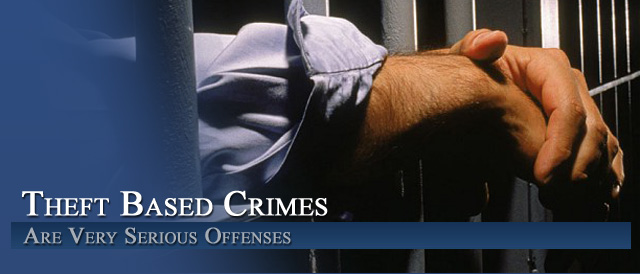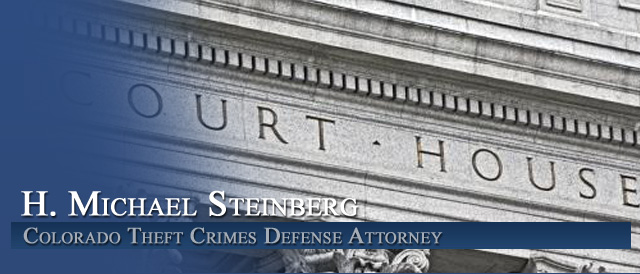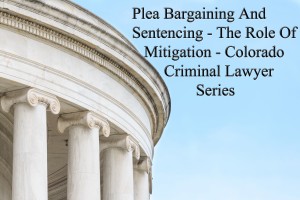




Plea Bargaining And Sentencing – The Role Of Mitigation – Colorado Criminal Lawyer Series
By H. Michael Steinberg Colorado Theft Crimes Criminal Defense Lawyer
 Plea Bargaining And Sentencing – The Role Of Mitigation – Colorado Criminal Lawyer Series – Since very few cases actually go to trial in the Colorado criminal justice system – ( less than 5 % by most analysis), understanding the importance of strategic, effective, and intelligent negotiations is critical.
Plea Bargaining And Sentencing – The Role Of Mitigation – Colorado Criminal Lawyer Series – Since very few cases actually go to trial in the Colorado criminal justice system – ( less than 5 % by most analysis), understanding the importance of strategic, effective, and intelligent negotiations is critical.
This article addresses the key and critical role of using mitigation information on your client during plea bargaining negotiations and at sentencing.
What Is Mitigating Information and What Are Mitigating Circumstances?
One can best understand a mitigating factor by thinking about an aggravating factor. An aggravating factor tends to increase the potential for a harsher sentence. A mitigating factor does the opposite – it can reduce the likelihood of an unjust and harsh sentence. It is a factor that does not necessarily relate to the question of your guilt, but may support compassion and leniency.
If the evidence against you is strong and a trial is out of the question – then you will need to make your best case for a plea bargain and a “mitigated” sentence by the judge. To do that – your lawyer – (or you if you are representing yourself) – must know and understand the factors that will influence a DA and – or a judge to increase or decrease the legally available criminal punishments you ultimately face for the crime(s) you ultimately face.
Sentencing Information Usually Falls Into Two Categories
A sentencing judge is charged with the responsibility of interpreting ANY evidence or information that reasonably relates to a defendant’s culpability.
This information falls into two basic categories:
-
information about the crime (usually provided by the DA – Prosecutor)
-
information about the defendant (usually provided by the Defense Lawyer on behalf of the Defendant)
The Mitigation Investigation
While lawyers have the most important function of investigating any and all defenses to criminal charges – once that is done – and it is clear that the case should not go to trial because there is no cognizable defense or chance of acquittal – THEN a thorough secondary investigation should be conducted into the defendant.
If economically possible – an appropriate a psychiatrist, a clinical psychologist, or licensed social worker who has a background in forensic evaluations should be retained to make the most effective case for mitigation.
Any thorough investigation should be conducted into every aspect of the defendant’s life to dig deep into all historical information and background records that could reveal potentially mitigating information about the defendant.
The life history of the defendant identifying potential mental health issues along with statements from those persons who have had the most contact with the accused the most—his family – should be conducted. The family should be targeted because they have close up “firsthand” knowledge of the events in the defendant’s life.
The mitigation investigation should consist of the “circles of people and institutions” that the defendant had contact with during the course of his life as well as:
friends,
neighbors,
teachers,
clergy,
coaches,
employers,
co-workers,
physicians, and
therapists,
all tell the story of the defendant’s life…..
Locating And Using “Institutional Records”
Institutional records such as – school records, medical records, government agency records, employment records, military records, and even court or prison records – also help tell the story of the defendant’s life.
Records such as these can establish that the defendant – especially in a violent crime situation – is – outside of this aberrant case – a well adjusted and non-violent person with no indication of future dangerousness.
These records are used to paint a more accurate picture of a defendant’s life for the DA – Prosecutor and the Sentencing Judge. Mitigation “witnesses” can include professional experts, lay experts, and family and friends.
What Are Some of The Most Common Mitigating Circumstances?
The Defendant Played A Minor Role In The Crime.
The Victim’s Own Culpability – The victim willingly participated in the crime or initiated the events leading to it.
The Defendant Acted Under A Heat Of Passion – The defendant committed the crime as a result of a temporary emotional difficulty, a significant provocation or under extreme stress.
Little Or No Harm Resulted From The Defendant’s Actions – No one was hurt and the crime was committed in a manner not likely to cause harm. Here the degree of property loss, personal injury, or threatened personal injury was substantially less is usually characteristic for the criminal conviction.
The Defendant Has A Total Lack Of Criminal History or a Minor Record
The Defendant Acted To Obtain Necessities
The Defendant Accepts Responsibility and Has Genuine Remorse
The Defendant Has Had a Very Difficult Personal History
The Defendant Has An Addiction – Drug and / or alcohol addiction contributed to the crime.
The Defendant Was Only An Accomplice or Accessory to the Crime Not A Major Player
The Defendant Was Under the Influence Of Drugs and or Alcohol At The Time Of The Crime
There Was A Mistake of Fact – Or Mistake Of Law – The Defendant mistakenly believed his conduct was legal.
Little Chance Of Repeated Crimes – There is little chance the Defendant will recividate – the character, habits, mentality, propensities, and activities of the defendant a;; support the proposition that he is unlikely to ever commit another crime.
The Defendant Has A Stable Work History – The Defendant’s background – educational, home life, sobriety, and “social adjustments” all recommend leniency. Here is where documentation can make a difference – documents from the Defendant’s schools; oral and written testimony from character witnesses, public records; news clips; and such items as a certificate of honorable discharge – all assist in painting the true picture of the Defendant.
The Defendant Will Quickly Return To A Normal Life – The Defendant will quickly adjust to law abiding behavior once released.
The Defendant Will Clearly Benefit From Successful Therapeutic Or Other Mental Health Treatment – Rehabilitation opportunities appear very strong and the Defendant’s likelihood of compliance is nearly certain.
The Defendant Cooperated With Law Enforcement In The Investigation Of The Case
The Defendant’s Prior Experience With Probation Or Parole Was Exemplary
The Defendant Has The Capacity To Pay Restitution
The Defendant Spent A Considerable Amount Of Time In Jail Awaiting Sentencing
Further Imprisonment Of The Defendant Would Create Excessive Hardships On His – Her Dependents
The Community’s Attitude Toward The Defendant’s Crime Has Changed – The best example of this is the change of the law enforcement’s attitude to the “War On Drugs.”
Assisting The Colorado State Or Local Probation Officer In The Preparation Of The Pre-Sentence Report – The PSIR
Many times the probation officer who is charged with writing the pre-sentence report is only presented with information from such sources as police reports and victim impact statements. The experienced Colorado criminal defense lawyer must provide the mitigation information to the probation officer as it will probably not come from any other source.
Some Suggestions In This Regard
Gather detailed background information from the Defendant and family members with the goal toward identifying and substantiating issues that have a positive influence on sentencing as well the Defendant’s eligibility for programs.
Attempt – in advance of the pre-sentence report – to explain or mitigate issues that may have a negative impact on the sentencing hearing or later placement in rehabilitation based programs.
Decide whether:
-
a psychiatric evaluation
-
a substance abuse evaluation
-
a medical evaluation, or other testing
…would be beneficial to the client’s case – and – if financially feasible – have them done.
Not only send all other positive information to the probation officer, (which should assist in outlining the client’s social history, and also identify and enumerate all appropriate factors), but also include verification of the information – as much as is possible.
Include in the package character letters from family members and all other credible people who will attest to the Defendant’s excellent employment history, community service, or even their role as a mother or father.
E-mail the letter and mitigation package to the probation officer. If the items are sent by email – in PDF format for example – the PO can “cut and paste” the information directly into the pre-sentence report making easier to use the words YOU want the PO to use.
Good Luck
Plea Bargaining And Sentencing – The Role Of Mitigation – Colorado Criminal Lawyer Series
If you found any information I have provided on this web page article helpful please click my Plus+1 button below so that others may also find it.
ABOUT THE AUTHOR: H. Michael Steinberg – Email The Author at [email protected] – A Denver Colorado Theft Crimes Criminal Defense Lawyer – or call his office at 303-627-7777 during business hours – or call his cell if you cannot wait and need his immediate assistance – 720-220-2277.
If you are charged with A Colorado crime or you have questions about the topic of this article – Plea Bargaining And Sentencing – The Role Of Mitigation – Colorado Criminal Lawyer Series, please call our office. The Law Offices of H. Michael Steinberg, in Denver, Colorado, provide criminal defense clients with effective, efficient, intelligent and strong legal advocacy. We can educate you and help you navigate the stressful and complex legal process related to your criminal defense issue.
 H. Michael Steinberg, is a Denver, Colorado criminal defense lawyer with over 40 years of day to day courtroom experience – specializing in Colorado Criminal Law along the Front Range. He will provide you with a free initial case consultation to evaluate your legal issues and to answer your questions with an honest assessment of your options. Remember, it costs NOTHING to discuss your case. Call now for an immediate free phone consultation.
H. Michael Steinberg, is a Denver, Colorado criminal defense lawyer with over 40 years of day to day courtroom experience – specializing in Colorado Criminal Law along the Front Range. He will provide you with a free initial case consultation to evaluate your legal issues and to answer your questions with an honest assessment of your options. Remember, it costs NOTHING to discuss your case. Call now for an immediate free phone consultation.
Helping Clients To Make Informed Decisions In the Defense of Colorado Criminal Cases.
Contact A Lawyer with Three Decades of Experience as a Denver Criminal Attorney at The Steinberg Colorado Criminal Defense Law Firm today.
Colorado Defense Lawyer H. Michael Steinberg regularly appears and provides solid criminal defense for clients throughout the Front Range of Colorado – including the courts of:
Adams County (Adams County criminal defense lawyer), Arapahoe County (Arapahoe County criminal defense lawyer), City and County of Boulder (Boulder County criminal defense lawyer), City and County of Broomfield (Broomfield County criminal defense lawyer), City and County of Denver (Denver criminal defense lawyer), Douglas County (Douglas County criminal defense lawyer), El Paso County – Colorado Springs (Colorado Springs criminal defense lawyer), Gilpin County (Gilpin County criminal defense lawyer), Jefferson County (Jefferson County criminal defense lawyer), Larimer County, and Weld County ( Larimer and Weld County criminal defense lawyer,….
and all the other cities and counties of Colorado along the I-25 Corridor… on cases involving the subject of this article – Plea Bargaining And Sentencing – The Role Of Mitigation – Colorado Criminal Lawyer Series.
Other Articles of Interest:
- Mandatory Sentencing To Jail – Prison For Repeat Convictions For Felony Theft – 18-4-413
- Objecting To DA’s Use Of Computer Simulations – Animations – Colorado Criminal Law Series
- A Guide To The Defense Of Persons With Mental Illness In The Colorado Criminal Justice System
- How To Defend A Colorado Criminal Theft Charge – Tactics And Common Sense
- Helping The DA To “See” The Impact Of Colorado Drug Convictions And College Applications












